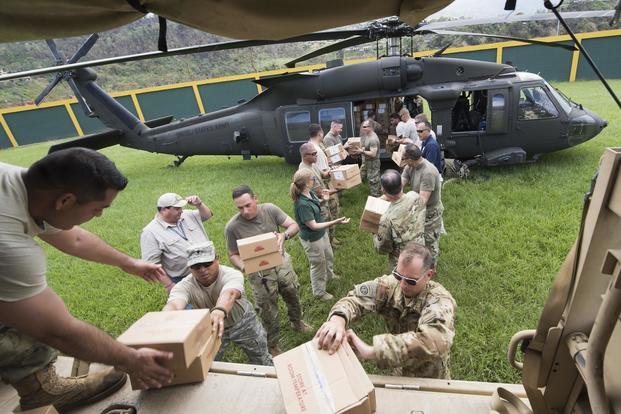In a series of Tweets on Thursday, President Donald Trump suggested that Defense Department and FEMA relief efforts in Puerto Rico might be coming to an end -- even as the military expanded its response on the island, which has been battered recently by Hurricanes Irma and Maria.
Trump renewed his criticism of the island's government for the parlous state of infrastructure before the storms hit and said, "We cannot keep FEMA, the Military & the First Responders, who have been amazing (under the most difficult circumstances) in P.R. forever!"
About 90 percent of Puerto Rico's 3.4 million U.S. citizens lack electricity, and only about 64 percent have access to potable water, according to the DoD, but Trump said in his Tweets, "Electric and all infrastructure was disaster before hurricanes."
He again referred to Puerto Rico's debt of more than $70 billion to bondholders and said Congress must "decide how much to spend" on a bailout.
Related content:
- Hospital Ship Takes on Critical Patients in Puerto Rico Crisis
- Military Response in Puerto Rico Delays Deployments to Afghanistan
- Video: Marines Deliver Food and Water to Puerto Rico
At a White House briefing later, retired Marine Gen. John Kelly, the White House chief of staff, sought to clarify Trump's remarks.
Kelly said an immediate pullout of the military and the Federal Emergency Management Agency from Puerto Rico is not under consideration.
He said Trump's Tweet was "exactly accurate" that the relief effort is not open-ended but added, "This country, our country, will stand with those American citizens in Puerto Rico until the job is done."
Kelly put no timeline on how much longer the relief effort will continue, but said traditionally in the military, "You are trying very hard to work yourself out of a job."
He said he is hopeful that a withdrawal could come "sooner rather than later."
House and Senate Democrats immediately condemned Trump's remarks.
Senate Minority Leader Chuck Schumer, a New York Democrat, tweeted a question to the president: "Why do you continue to treat Puerto Ricans differently than other Americans when it comes to natural disasters?"
"FEMA needs to stay until the job is done and right now, it's not even close to done," Schumer said. "There is still devastation, Americans are still dying."
Puerto Rican Gov. Ricardo Rossello said in a Tweet, "U.S. citizens in Puerto Rico are requesting the support that any of our fellow citizens would receive across our Nation."
As of Tuesday, three weeks after Hurricane Maria hit the island as a Category 4 storm, the death toll stood at 43, according to island officials.
The DoD said 13,420 active-duty and National Guard personnel are now involved in the military's response on and offshore, and 92 rotary aircraft and 14 fixed-wing aircraft are operating on the island.
Their efforts are focused on power restoration; distribution of power generators and food, fuel and water; medical support, route clearance, and aviation support; and continuing work by the U.S. Army Corps of Engineers (USACE) in shoring up the badly eroded Guajataca Dam in the island's northeast, the DoD said.
Of the 69 hospitals on the island, 36 are back on the power grid and the rest are struggling to operate on generators, the DoD said.
Twenty-nine of 51 wastewater treatment plants are operational and running on generator power, and 78 percent of Puerto Rico's gas stations are now open, it said.
The hospital ship USNS Comfort is involved in medical support in Aguadilla on Puerto Rico's western tip, and elements of the14th Combat Support Hospital (CSH) are arriving and expected to begin operations in Humacao, west of San Juan, next week.
U.S. Transportation Command also is keeping assets in San Juan for the possible evacuation of patients to the continental U.S., the DoD said.
Last week, the Pentagon said the military's commitments, particularly of air assets, in responding to a quick succession of hurricanes in the U.S. and across the Caribbean will have an impact on worldwide deployments into next year.
At a Pentagon briefing last week, Marine Lt. Gen. Kenneth McKenzie, the Joint Staff director, said there will be a delay in the planned deployment of additional troops to Afghanistan.
-- Richard Sisk can be reached at Richard.Sisk@Military.com.






























